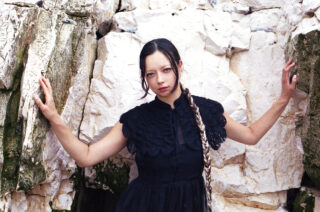Lucinda Chua: “I wanted to create my own language”
The cellist and songwriter is striding out alone with her intriguing solo debut

The cellist and songwriter is striding out alone with her intriguing solo debut
“I like the symbol of the swallow as being this songbird that lives in the in-between,” singer-songwriter Lucinda Chua tells me on a cloudy Tuesday afternoon.
The 37-year-old multi-instrumentalist is talking about the name of her latest album, YIAN, out now on 4AD. YIAN doubles as both her Mandarin name and her Chinese grandmother’s name. Chua found that the more she dug into the meaning of the word the more apt it felt. “I started thinking about the swallow as migrating between these two landmasses,” she says, “and, maybe, for the swallow, home is in the sky, and if you can belong to the sky, then you kind of belong to everything.”
For Chua, this flitting between worlds is pertinent: she was born in Hammersmith to an English mother and a Chinese-Malay father, moving to Milton Keynes when she was 10. For her entire life she has been torn between identities and worlds and, being biracial, even caught between two separate migrant cultures, an even more specific niche within the diasporic experience.
She found solace in the cello, training classically before using an array of effect units to write ambient pop songs that are intimate and atmospheric. Initially, she was one half of the duo Felix as well as touring for artists, including FKA Twigs’s live band. It was when the pandemic struck and tours were cancelled that she initially sketched out YIAN. “Thinking about making an album really helped me with a sense of purpose,” she says.
To challenge herself further, Chua self-produced and engineered eight of the ten tracks on YIAN, an intentional decision for many reasons. “I think it was very important for me, on this record, to not feel observed,” she says. “I wanted to create my own language without someone classifying what I was doing.”
The result is ten tracks which wrap themselves around the listener, like a weighted blanket after a stressful day. A series of intimate portraits strung together to make a dazzling collage, there is a softness throughout YIAN: it is nourishment for the soul, a balm to heal oneself where intimacy and grandiosity meld themselves seamlessly. There is a magnetic, shimmering charm that underpins the lush melodies throughout the album. The timbre of the cello is the fulcrum upon which the swirling instrumentation creates a dizzying effect. The recurrence of the yearning of a broken heart, a cry for a past lover emerges continuously. At times, it even sounds like an intimate conversation, with lines like “I don’t want to hurt you” sung softly on repeat. It feels as if her past as a photographer subconsciously plays into the creation of her music.
“I definitely think about producing in terms of what could be a wide shot and what could be a close-up,” Chua says. “The connection between photography, producing and composing is all about world-building: thinking about, like, ‘What is the story? What is the journey? What are the emotions that you want to share with people?’ And then it’s almost like the feeling drives the form.
“I didn’t expect for it to take me as deep as it did,” she says of the album themes. “Being biracial and having multiple heritages, but I do tend to talk about myself in fractions. It’s taken a lot of unlearning to be able to not do that.”
With the impending release of the album, Chua is both “scared and exhilarated”. “A lot of my life, I’ve been the ensemble player,” she says. “I felt very comfortable in that supporting role. And I felt very grateful to get to be part of [other people’s] journey, [but] it’s important that I get to expand the perception of what East and South-East Asian music sounds like – that it’s not necessarily a singular thing.
“I went into this album with questions of ‘Who am I? What does this mean? Where do I come from? Where do I belong?’” she says. “But, I feel like I’ve come out of making the album with just as many questions. I think it’s a commitment to questioning and learning and growing and being okay with that absence or, rather, that feeling of incompleteness, because maybe that’s the joy of being alive: being able to grow into that space.”
Photography by Yukitaka Amemiya